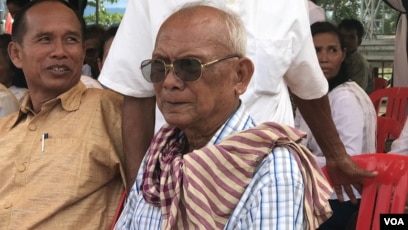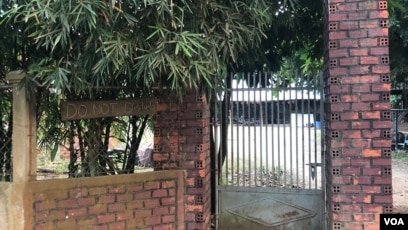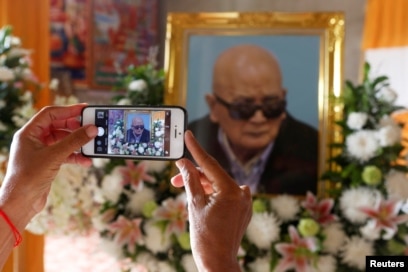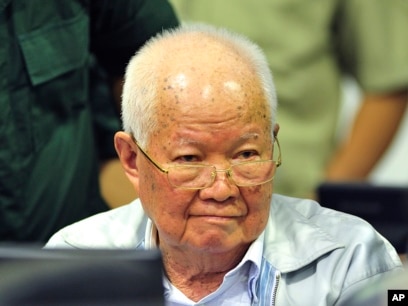26 November 2019
- Sun Narin
- VOA Khmer
TA SANH COMMUNE, BATTAMBANG PROVINCE —
The sign outside Meas Muth’s house is very clear. The house, shielded from the outside world by high walls and fencing, is by far the largest in Ta Sanh commune, in the northwestern province of Battambang.
The wooden sign is tied to the metal fencing. On it are the words “DO NOT Disturb”, pieces of rope used to create the letters. And Meas Muth’s wife seems to be the enforcer of that diktat.
As a VOA Khmer reporter attempted to enter the compound to speak to the former Khmer Rouge naval commander last week, Meas Khim, his wife, walked from the kitchen and said there was “no need to meet him.” Towards the back of the house, Meas Muth could be seen walking away.
Meas Muth’s case at the Extraordinary Chambers in the Courts of Cambodia will be heard this week. Starting from November 27, the hybrid court will hear appeals for three days challenging whether Meas Muth is qualified as a senior official, and therefore liable to be indicted for crimes committed during the genocidal regime’s rule in the late 1970s.
He was charged in 2015 for genocide and crimes against humanity, among a raft of other charges. However, in 2018, Co-Investigating Judges in the case differed on whether he should have been charged.
The National Co-Investigating Judge opined that Meas Muth’s role was more in line with facilitation of the crimes, whereas the International Co-Investigating Judge found that he was responsible for the crimes and could be indicted.
A short distance from Meas Muth’s house, Ta Sanh Commune Chief Chum Horn said it was very possible that the former Khmer Rouge member was at the top of the regime’s hierarchy, especially because his father-in-law, Ta Mok, was a senior military commander.
But he quickly adds that it was up to the court to decide his actual position in the regime. “This is the court’s affairs. I don’t know,” Chum Horn said.
A Secluded, But Privileged, Life
Meas Muth’s house, as compared to those around it, looks like it is inhabited by wealthy residents. Villagers in the commune said he is by no means poor, and claimed he owned various plots of land in the commune.
Unlike other Khmer Rouge leaders – such as Ta Mok, who continued to hold the respect of some villagers in their strongholds – Meas Muth did not seem to be completely revered by residents in his longtime commune, Ta Sanh. Some residents questioned his wealth.
“Have you seen his house?” said commune chief Chum Horn.
Ek Voeun, 50, has been in Ta Sanh since Meas Muth made it his personal stronghold following the fall of the Khmer Rouge. According to her, Meas Muth is aging and has had to go to Thailand multiple times to get medical treatments.
“His health is deteriorating. He is so aged,” she told VOA Khmer at the same local pagoda Meas Muth visits almost daily.
“If he didn’t have the money he would have [probably] died.”
The former Khmer Rouge commander makes daily visits to the pagoda, but his old age has prevented him from walking. He is often driven there in a car or seen on the back of a motorcycle.
While older villagers in the commune know Meas Muth, given that Samlot district was one of the last redoubts of the Khmer Rouge, newer residents are aware of his presence but are keeping their distance from him.
Im Sokheng, a 55-year old villager, said she moved to Ta Sanh two years ago and was made aware of the Khmer Rouge leaders’ presence in the commune. But, she has stayed away from him.
“He is older and he was former Khmer Rouge; so, we don’t dare to talk to him,” she said. “Even though I go to the [same] pagoda, I do not dare to sit next to him or talk to him.”
Her husband, Hay Duk, 57, shares a similar opinion to many in the commune on Meas Muth’s upcoming appeal hearing.
“If he had a higher position, he should face prosecution. But if he just got orders, he should not [be prosecuted],” he said.
A Bellwether Case
Prime Minister Hun Sen has previously expressed that he wanted the tribunal to end its proceedings with Khmer Rouge leaders, Nuon Chea and Khieu Samphan, adding that further convictions could cause civil unrest in Cambodia.
So far, former head of the S-21 prison Kaing Kuek Eav has been convicted of crimes against humanity and for grave breaches of the Geneva Conventions, and is serving a life sentence.
“Brother No.2” Nuon Chea and Democratic Kampuchea’s Head of State Khieu Samphan have been convicted for crimes against humanity. They were also found guilty of the crime of genocide, but that conviction is currently under appeal. However, Nuon Chea’s death in August has raised questions over future course of the senior Khmer Rouge leaders’ appeal.
In February 2017, the court dismissed charges against Im Chaem, a former district chief in the regime, saying she was not a senior leader or most responsible for the crimes of the Khmer Rouge. Two other suspects, Ao An and Yim Tith, have yet to be arrested or indicted.
So, the progress of Meas Muth’s case will likely set the course for the court’s and, importantly, the government’s, handling of the remaining cases before it.
While, court observers have become accustomed to seeing Kaing Kuek Eav, Khieu Samphan and Nuon Chea in the court during their trials, Meas Muth will not be present at the tribunal’s premises on Wednesday, according to court spokesperson Neth Pheaktra.
Pheaktra said that Meas Muth had decided to “exercise his right to remain silent.”
Hong Kim Suon, a lawyer for civil parties, said the victims were insistent that Meas Muth and other accused be brought to justice, to ensure a sense of justice and closure for those devastated by the atrocities of the Khmer Rouge.
“He [Meas Muth] had a high position and was very responsible [during the regime],” said Hong Kim Suon. “The victims demand prosecution against them so that they feel relieved.”
Youk Chhang, the director of the Documentation Center of Cambodia and a victim of the regime, said the court needed to push ahead with prosecuting the remaining accused because the decision to drop the charges against Im Chaem in 2017 had let down victims.
“It is like swallowing scattered stones, but we have to force ourselves to accept [it],” he said.





No comments:
Post a Comment